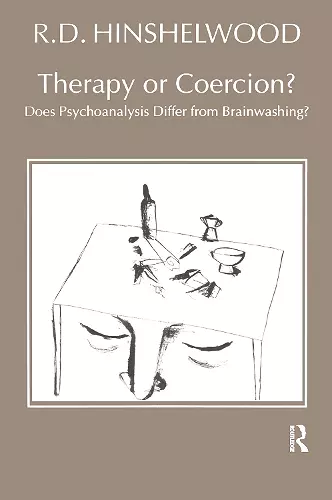Therapy or Coercion
Does Psychoanalysis Differ from Brainwashing?
Format:Paperback
Publisher:Taylor & Francis Ltd
Published:31st Dec '97
Currently unavailable, and unfortunately no date known when it will be back
This paperback is available in another edition too:
- Hardback£135.00(9780367329198)

This book questions whether 'autonomy' is a pivotal psychotherapeutic value. Basing his discussion upon the key Kleinian concept of 'projective identification', the author argues that 'integration' should be the aim of psychoanalysis, and - furthermore - that actions can be judged ethical or unethical according to whether they foster or hinder integration.
'Psychoanalytic and psychotherapeutic ethics are increasingly under scrutiny. In this major contribution, Hinshelwood questions autonomy as a pivotal psychotherapeutic value. How can we speak of autonomy, he asks, when the self is split, and projected, or, in his term, "spread" around the individual. Basing his discussion around the Key Kleinian theme of projective identification (a phrase which Hinshelwood dislikes, despite seeing the process as central to psychoanalytic work), he argues that integration should be the aim of psychoanalysis, and that acts can be judged as ethical or unethical according to whether they foster, or hinder, integration. Using an image of a bumped car from a patients dream, Hinshelwood sees moving as a metaphor for psychoanalytic change - both in its emotive and translocationary sense, and, when necessary, with the challenge and creative aggression that the term also implies. He contrasts this with collusive - in his terms, unethical - therapy, in which the therapists or psychiatric units are content permanently to contain parts of the patient's projected self - for example their competence, ability to think or nurture themselves - and do nothing to try to help reintegrate such projections.'Hinshelwood has already established himself as a leading exponent of Kleinian psychoanalysis. This is perhaps his most original and personal work to date, and is a showcase for his unique virtues as a thinker and writer, now at the height of his powers. His dogged determination to follow ideas through to their conclusions, his honesty and modesty, his wider vision of the contribution of psychoanalysis to group therapy and therapeutic community, combined with huge clinical experience and fingertip knowledge of the Kleinian literature, make him an outstanding figure in British psychoanalysis. This book is destined to become a classic, and will be widely admired within the psychoanalytic and philosophical communities.'- Jeremy Holmes, M.D., FRCPsych
ISBN: 9781855751439
Dimensions: unknown
Weight: unknown
272 pages